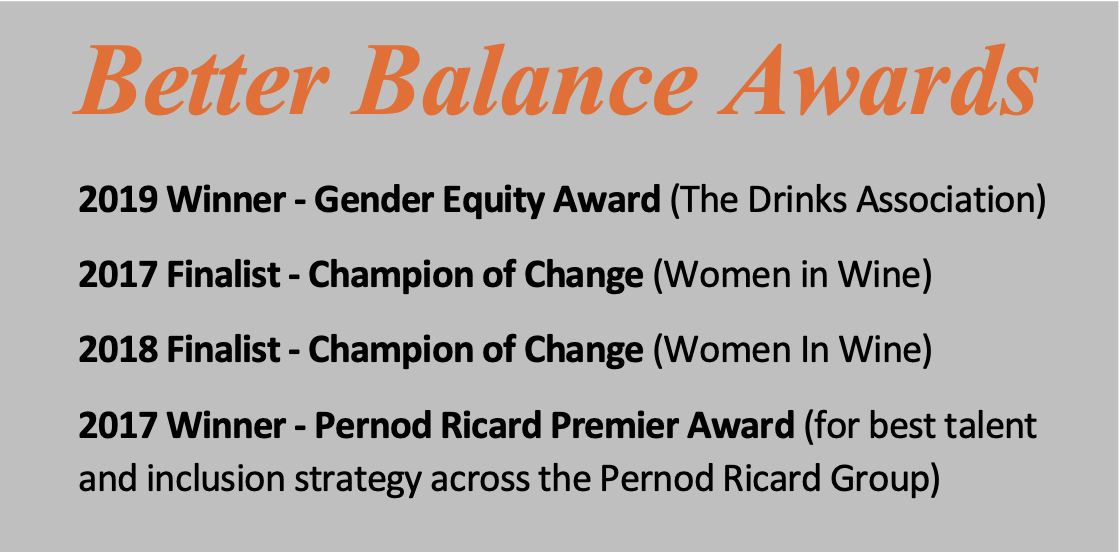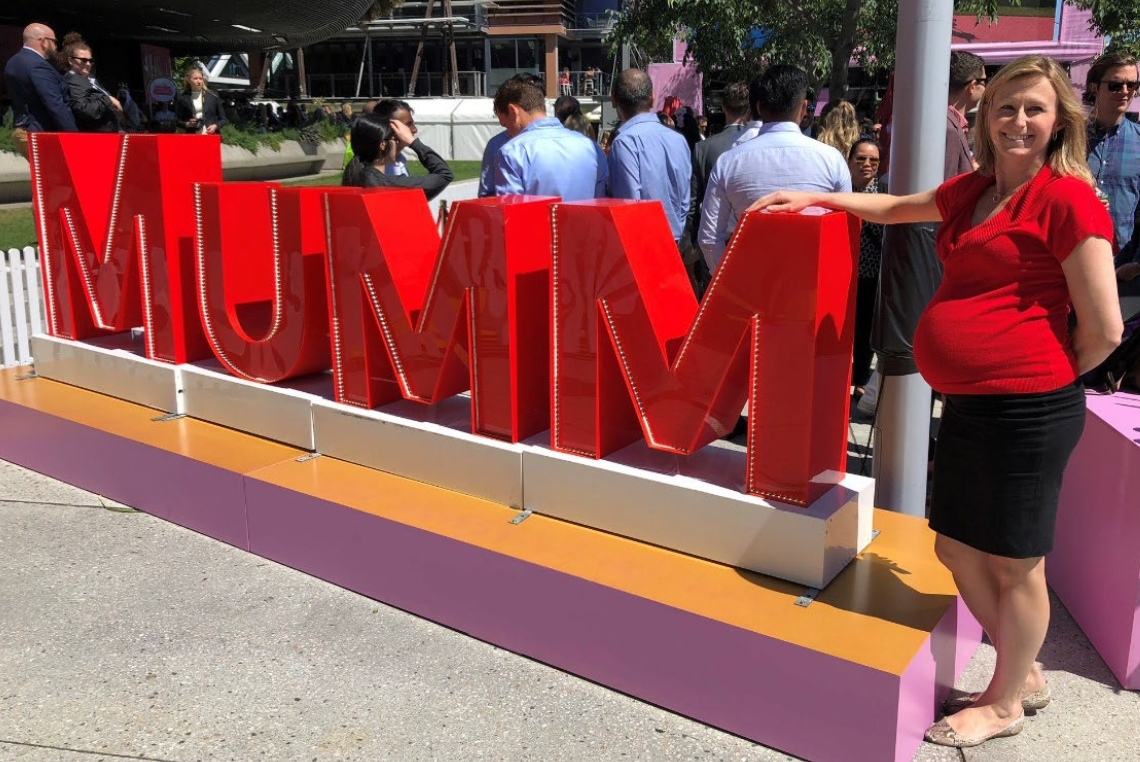Jenny Thomas (pictured) was Pernod Ricard’s Sales and Operations Manager for just six months when she found out she was pregnant. Her manager’s response? “A double high five!”
“The parental leave policy is great but support from leadership has been amazing,” she says.
Jenny’s next pleasant surprise was her eligibility for full parental leave entitlements. While most organisations don’t provide access to leave entitlements before the completion of 12 months of employment, Pernod Ricard offers full parental leave entitlements after just 12 weeks of employment.
“We are really proud to have reduced the parental leave eligibility period to three months of employment – designed to come into effect following a standard probationary period,” confirms Ashlee Thackeray, Pernod Ricard’s HR Business Partner – Strategy & Projects. “Our research suggests it is unique and we are proud to offer this to people considering a career with us.”
Jenny was then impressed with the generous three-month overlap with her replacement. “I was able to train my replacement and transition out of the role then complete some extra projects before leaving.” she says.
Being offered a free parking space for her last trimester was the icing on the cake. “It was such a nice touch and can make a big difference when commuting downtown gets more difficult,” she recalls.
Outcomes such as these are the result of Pernod Ricard’s ‘Better Balance’ diversity and inclusion strategy that was launched to the business in 2017.
“So much of my social interaction comes from work and that’s what I miss the most. Staying in touch with everyone via WhatsApp has helped me to stay connected to my team and the business.”
“‘Better Balance’ detailed a three–year roadmap of core action items,” Ashlee outlines. “One of the first focus areas for our diversity and inclusion strategy was gender equity. Research showed us that our parental leave offering was a key contributor to increasing this.”
“The strategy extends across our pacific business, as well as across the US and Spain, and is supported by our leaders in each country.”
One of the key features is a comprehensive parental leave checklist to help managers tailor the parental leave experience to each individual and recognises that the employee’s preferences may change throughout the parental leave.
Highlighting all the benefits that can be accessed throughout parental leave in the policy has been incredibly well received, Ashlee says, and empowers managers with the information to be able to engage with their teams directly.
“It equips our managers with the knowledge to support their employees in discussing key benefits, and partnering with their employees directly through the full process, as opposed to being directed to HR.”
Staying connected is another linchpin, but Ashlee reinforces that the business recognises its role in proactively creating avenues to stay connected with employees on leave.
“We want to ensure all employees feel connected to the business, so we seek preferences around communication from anyone on leave and then we manage the contact accordingly, as little or as much as they want, via email, intranet, ‘Keep in Touch Days’, etc,” she says.
“We also have a WhatsApp group for new parents in our business, which includes partners of employees who are on parental leave. A selection of managers from each office are connected to the group so they are readily available to answer any questions.”
“So much of my social interaction comes from work and that’s what I miss the most. Staying in touch with everyone via WhatsApp has helped me stay connected to my team and the business,” Jenny concurs.
“We also reconnect with our people when it comes to bonuses, annual performance reviews and to notify them of new employment opportunities while they are on parental leave,” Ashlee continues. “It is important that every employee has the opportunities to continue to grow their career, and this has resulted in employees being promoted whilst on parental leave.”
Flexible work options are another core component. Ashlee cites their critical importance for successful return to the business and retention following any significant leave, whether it be parental leave, long service leave, sick leave or sabbatical.
“It is really about the employee driving what they need and then the business exploring ways to support their flexibility request, whether this be working from home, a change in start/finish times, or formal arrangements such as reduced hours and part-time.”
“We also acknowledge the importance of quality ‘return to work’ processes, and so have invested in guides to help support our managers in this process,” Ashlee continues. “In addition, supporting our people returning to work with any training and additional education as needed.”
Although a relatively new policy, ‘Better Balance’ is achieving tangible outcomes across the organisation’s international operations (Australia, New Zealand, Spain and the US). They have achieved 44% female representation in leadership roles, up from 34% in FY2016, and 42% female representation across the business, up from 38% in FY2016.
In addition, women represented 46% of the 2019 Australian vintage recruitment intake (up from 40% in 2018), and New Zealand achieved 50/50 vintage recruitment (up from 43% in 2018).
Ashlee reinforces the importance of backing from the executive team and management across the business for both the successful development of policies and for their subsequent adoption throughout the business.
“Helen Strachan and Darren Hakof sit on the executive team and are passionate about this topic, and actively promote and discuss Better Balance throughout the business,” she says.
“From a leadership perspective, men who have taken parental leave have commented that their understanding of parenting, as a primary carer, gives them greater understanding… and therefore supports in growing greater awareness and inclusive leaders in the business.”
Further to this, ‘Growing Diverse Teams’ is one of Pernod Ricard’s global leadership competencies, meaning this behaviour is embedded throughout the organisation and included in all employee annual performance and development reviews.
While many companies struggle with resistance to diversity and inclusion policies at different levels, this has not been an issue for two key reasons.
“Firstly, we actively seek feedback from line managers and the wider HR team with the intention to continue to evolve,” says Ashlee.
“Our leadership and management teams have done an incredible job of truly implementing the value of these policies, and Jenny’s feedback is a testament to not only the benefits and resources available, but to her Manager.”
“Secondly, we share insights into how increased flexibility is both a benefit to the business and to all our employees, of which parental leave is just one example. A culture of flexibility creates opportunities for employees who may choose to utilise flexible arrangements for sporting commitment, health and wellbeing, hobbies and so forth. It creates a more rewarding working environment for all and is a great way to support both the lives and development of all our people, in all circumstances, and at all levels.”
Pernod Ricard’s dedicated diversity and inclusion website includes all policies relating to parental leave plus a library of external resources (carefully curated by Ashlee) that are relevant to anyone keen to prioritise family, either personally or within their business. It also includes parental leave stories from within the organisation, and Ashlee acknowledges the impact this can have on promoting parental leave as a very real option for fathers.
“Story telling is powerful,” Ashlee explains. “It plays a key role in ensuring everyone knows they are represented within our policies. Our storytelling sought to share how these changes were beneficial to all our people, not just particular groups/circumstances, and we sought equity in all changes.”
“From a leadership perspective, men who have taken parental leave have commented that their understanding of parenting, as a primary carer, gives them greater understanding of the necessity for flexibility, and therefore supports in growing greater awareness and inclusive leaders in the business.”
Jenny agrees, stating, “Our senior leaders are great role models of work/life balance, diversity and parental leave. An example is when one of our Directors in the business took three months of parental leave to be his baby’s primary carer when his wife returned to work. He was inspiring for me and even pointed me to two of my favourite apps for tracking feeds and nappies”.
Despite the great outcomes, Ashlee is far from complacent. “This policy is not something we have developed and will simply park. We will keep reviewing it annually and when we see opportunities to evolve and improve our policies, we will.”
In line with this thinking, they have just completed a major review of their diversity and inclusion strategy in preparation for the launch of Better Balance 2.0.
And it is a responsibility that Ashlee is more than happy to shoulder. “I’ve found it incredibly rewarding to work on. Once I started looking into it and really researching best practice in terms of gender diversity and parental leave, the great opportunities we could introduce for our people became apparent.”
“We really believe this is key to keeping and fostering talent within our business and is essential for long term business growth.”
Pernod Ricard Better Balance Strategy
KEY COMPONENTS
- Flexible Working Policy and Guides.
- Flexible Working Online Library (peers share how they are ‘working flexibly’).
- Remote & Flexible Team training modules for leaders.
- Parental Leave (primary & non-primary carer) policies and support.
- Domestic Violence paid leave & Support Guide.
- Development and implementation of a Global Better Balance Ambassador Network of cross-functional leaders.
- Better Balance Awareness Workshops, led by the Ambassador Network, focusing on the case for change (24 sessions across 9 different sites in AU, NZ, ESP, US).
- Hiring Managers trained in Recruitment & Unconscious Bias Training.
- Increased memberships with key bodies – NAWO, Women in Drinks, Women in Wine.
- Launched the internal diversity and inclusion strategy website.
- Introduced the Transitioning in the Workplace Guide.
- Inclusion of Pernod Ricard’s global commitment to equal pay across the business by 2022 and 45% female representation in leadership roles by 2030 in the organisation’s Sustainability and Responsibility Roadmap.

Jenny Thomas(second from right) attending the Pernod Ricard Strategy Day with the Supply Chain Leadership team 
